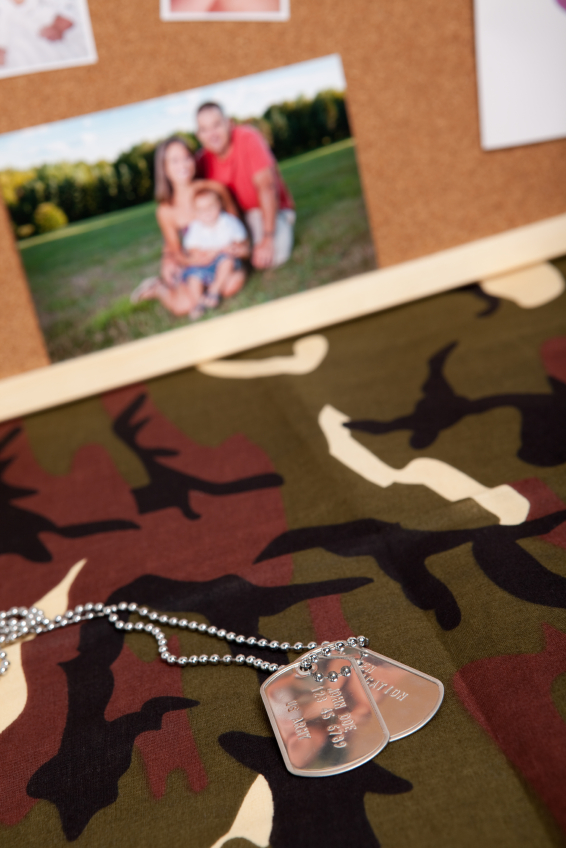By Lisa Kain
Army spouse Stefanie was far from family, and her husband was on deployment far from home. She spent many days and nights studying YouTube sewing sessions and was fascinated with the hobby. The mother of two was already dealing with caring for the homefront alone and working through deployment, so why not built a business from the ground up. And that meant learning to sew. Stefanie began with a few tutus and burp cloths and now her company, Abby Maddy, designs and produces an entire line of accessories to include scarves, earrings and clutches, and this fall, was coveted by Hollywood royal Tori Spelling.
Staff writer Lisa Kain sat down with Stefanie to discuss the ups and downs of starting a business as a military spouse (and while dealing with deployment!)
1. What was the inspiration in starting your business? How did the idea come about? My daughter (Abigail Madison) the namesake of my company was definitely my inspiration. I started Abby Maddy when she was only 18-months-old and I was pregnant with my son. At the time, my father was terminally ill with cancer and my husband was about to deploy again. There was a lot going on back then, and now when I look back on it, I realize just how therapeutic launching a business was for me. Originally, our line consisted of baby items, until we phased them out in 2013. There were a lot of late nights spent sitting at my dining room table with a sewing machine and a computer. Oh yeah, did I mention I didn’t know how to sew and I had to teach myself? There was a lot on my mind back then and working through each piece of Abby Maddy was soothing to me and still is.
What have been some of your failures, and what you learned from them? I’m always trying new things, sometimes they work, sometimes, they don’t. I take notes and move on! It absolutely makes me crazy when someone has a beautiful business but gives it up after one set back! Failures and mistakes are going to happen. Consider it a learning experience and keep going. I would personally never want to be in business with someone who hasn’t experienced failure at least once.
How many hours do you work, on average? It varies greatly, but during the school year and at the height of new launches, 20-30 hours a week.
Is this your first business? If not, what were your others, and what happened to them? It’s my first time launching my own brand, but I’ve been in love with business for as long as I can remember. I learned retail at an early age working in my grandmother’s store - when I had to use a chair to be able to reach the cash register. I started my own direct sales business from my dorm room at age 19. It’s in my blood.
How did you finance your business and what was the process like? It’s important to me to build a debt-free business, and for the most part, we have done just that. In the beginning I carried a few items on my website that I didn’t make and the cash flow from those items financed my time to make the others. Eventually we phased those items out and now everything on the site is handmade in the studio. I am super budget conscious and I still teach sewing classes to help add cash flow to the business. It seems there is always an endless list of expenditures for a growing business!
How many employees do you have? I have an assistant, and a few others that help out on an as-needed basis, plus lots of great businesses we work with on marketing, branding, website design, etc. We’re hoping to add another team member this fall.
What is an average work day like for you? Well I’m a mom of a 6-year-old about to start kindergarten and a 3-year-old who is in preschool so there is no average day, it seems. Most school mornings, I’m up before the kids, have coffee, check emails, do a little social media posting on our various accounts, dress everyone, breakfast, get everyone off to school, then back to work for about two or three hours until it’s time to pick up my youngest. After lunch when everyone is down for nap, I work a bit more until late afternoon. Usually we try to do a craft, activity or play outside for a bit. Then its dinner, bath, bedtimes and more work in the evenings for me! They can be long days, especially when my husband is deployed or TDY but I absolutely love what I do, so it never feels like work.
Who are your customers? Initially, like most businesses, it was family and friends, but now we have customers all over. Generally, its women ages 25-45, but then again, sometimes it surprises me!
What are the most crucial things you have done to grow your business? Just do a little bit each day. You can’t go weeks and months in between product or updates. You have to stay relevant and stay in front of your customer. That’s just the reality of small business. And leave no stone unturned, Don’t listen to negative people and don’t let anyone plant pre-formed opinions in your head. Go to networking groups, hold speaking engagements and meet up with other business owners. Building your network is crucial- and a very important skill to have as a military spouse!
What plans do you have for expansion? Right now we are working hard at putting Abby Maddy in boutiques. So far we’ve had great feedback and our line seems to work well with fashion forward, independent shops. It’s been a lot of fun and whole new education working with retailers! But it is definitely where I want to be!
What has been your most effective marketing tactic or technique? We’re always trying new things, but you just can’t beat word of mouth advertising. When people love you, and love your products, especially women, they tell everyone. Take care of your customers, under promise and over deliver and your customers won’t let you down.
What are some of the challenges you have faced being an entrepreneur while living a military lifestyle? There are a lot of challenges, the obvious, of course, is how much we move, and not really being able to open a storefront. But I’ve always viewed it more as an opportunity. With every move we are planting our business in a new place and since I’m online, my customers are very loyal to me when I move. It also opens doors to contact retailers about having Abby Maddy being carried in their store - I have a connection to so many places that it allows my business to have roots that are as deep as they are wide.
What three pieces of advice would you offer entrepreneurs starting out today? 1) Start small, there is no shame in taking it slow. Don’t try to do too much right from the beginning. 2) Know that you are not going to get paid for a long time and make peace with it. 3) Whatever you do, don’t quit!
Visit Abby Maddy Designs on Facebook:
https://www.facebook.com/AbbyMaddyDesigns
Visit the website and shop! www.abbymaddy.com
Visit the Blog for tips and inspiration! www.abbymaddyinpired.com
Follow us on Pinterest! http://www.pinterest.com/abbymaddy/












